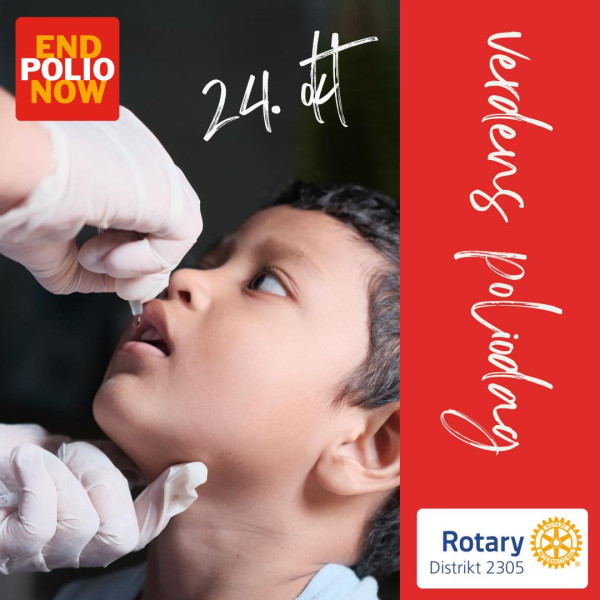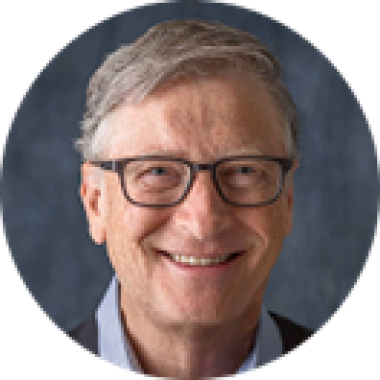Verdens Poliodag 24. oktober
Verdens Poliodag den 24. oktober markeres verden over av klubbene i Rotary. Rotary International er i førersetet når det gjelder bekjempelse og utryddelse av sykdommen Polio. Men det behøves penger til det viktige vaksinasjonsarbeidet. Støtt oss med VIPPS til 577258.

Bill Gates støtter arbeidet:
Gates, og Melinda og Bill Gates fond er en av de andre viktige medspillerne i denne kampen. Vaksinering er metoden som brukes for bekjempelse/ utrydding.
Resultatene som er oppnådd er fantastiske gode. Både Polio type-vill-2 og type-vill-3 er nå utryddet. Nå gjenstår kun Polio type-1 som forekommer i Afghanistan og Pakistan. I dag er vi svært nærme å kunne lykkes!
For hver 100-lapp vi i Rotaryklubbene samler inn til formålet, - vil Bill Gates legge til 100-lapper. Dvs våre 100 kroner blir til 300 kroner. Da monner det!
Støtt oss i dette arbeidet med VIPPS til Gjøvik Rotaryklubb, 577258.
Les et innlegg om saken fra Bill Gates her:
Vi er nærmere enn noensinne å utrydde polio
.

...Og nærmere enn noensinne å se en gjenoppblomstring. Av Bill Gates, publisert for 7 dager siden
Når folk flest i Amerika tenker på polio, tenker vi nok på president Franklin Delano Roosevelt. I 1921, i en alder av 39 år, ble han lammet av viruset og fikk aldri tilbake beina. Historien hans bidro til å gjøre polio til en nasjonal sak. Men på mange måter var opplevelsen hans en anomali.
Polio er tross alt i overveldende grad en barnesykdom, og de aller fleste tilfellene rammer de under fem år. Det var sant da FDR ble syk, og det er sant i dag. Den typiske pasienten er ikke en voksen med en allerede etablert politisk karriere – det er et lite barn, ofte et lite barn i et lavinntektsland, som kanskje aldri får sjansen til å ta sine første skritt.
Den urettferdigheten er en viktig grunn til at jeg har brukt de siste to tiårene på å utrydde polio. Den andre grunnen er at utryddelse faktisk er mulig, realistisk og innen rekkevidde. Dette er en sykdom vi kan bli kvitt – ikke bare kontrollere, men eliminere overalt. Det er en sjeldenhet innen global helse.
Verden har allerede gjort ekstraordinære fremskritt. Tilbake i 1988, da Rotary International og Verdens helseforsamling satte seg målet om utryddelse, lammet viruset mer enn 350 000 barn hvert år i 125 land. Siden den gang har tilfellene falt med 99,9 prosent. Stammene kjent som type 2 og type 3 vill poliovirus er utryddet. Hele det afrikanske kontinentet er sertifisert fritt for vill polio. Bare to land – Afghanistan og Pakistan – har fortsatt vedvarende overføring av type 1 vill poliovirus.
Nå er vi nærmere enn noensinne fullstendig utryddelse av polio. Men den siste milen viser seg å være den vanskeligste fordi virus finner måter å utnytte eventuelle immunitetshull eller svakheter. Der vaksinasjonsratene faller – selv kortvarig – kan de dukke opp igjen.
En av de største utfordringene kommer fra det som kalles variantutbrudd. I lokalsamfunn der immuniseringen er lav, kan det svekkede viruset som brukes i den orale poliovaksinen sirkulere asymptomatisk og i sjeldne tilfeller, over tid, mutere nok til å gjenvinne evnen til å forårsake lammelse hos uvaksinerte barn.
Selv om de fleste variantutbrudd skjer på steder med ekstremt lav vaksinasjonsdekning, dårlige sanitærforhold og svakere helsesystemer, er ingen steder risikofrie før verden er poliofri. I 2022 bekreftet USA sitt første tilfelle av lammelse av polio på nesten et tiår , og viruset ble oppdaget i avløpsvannsprøver fra New York. I tiden siden har varianter av poliovirus også blitt funnet i Storbritannia, Ukraina, Indonesia og andre land.
Den gode nyheten er at dagens verktøy er bedre enn noe vi hadde for bare fem år siden, og de sørger for at hver krone som brukes på saken går lenger enn noen gang før. Vi har en ny oral vaksine, nOPV2, som har langt mindre sannsynlighet for å mutere og føre til nye variantutbrudd; nesten to milliarder doser har allerede blitt gitt over hele verden. Nye regionale laboratorier i Ghana, Nigeria, Sør-Afrika og Uganda som tester avløpsvannsprøver og sekvenserer virus har redusert deteksjonstiden med over 30 prosent, noe som gir helsearbeidere et kritisk forsprang på utbruddsresponsen. Og overvåkingsnettverket for polio er et av de mest sofistikerte som noen gang er bygget – og bidrar også til å varsle helsepersonell om utbrudd av kolera, meslinger, ebola og til og med COVID-19 på høyden av den pandemien.
Gates Foundation har vært stolte av å støtte disse fremskrittene som en del av Global Polio Eradication Initiative , en koalisjon mellom WHO, UNICEF, CDC, Gavi, Rotary International og dusinvis av lands regjeringer. Det er et av de mest vellykkede samarbeidene i den globale helsehistorien.
Men akkurat nå står GPEI overfor et finansieringsgap på 1,7 milliarder dollar , ettersom diverse langsiktige giverland som har kuttet ned støtten sin. Uten de riktige ressursene må vaksinasjonskampanjer kanskje reduseres, overvåkingssteder vil sannsynligvis stenge, og viruset kan spre seg globalt.
I århundret siden FDR ble lammet av viruset, har amerikansk lederskap og generøsitet bidratt til å gjøre polio til en kamp hele verden kunne vinne. Fra March of Dimes, som finansierte forskning, til utviklingen av de første vaksinene, til støtte for utryddelseskampanjer, har amerikansk engasjement vært avgjørende.
Verden står på randen av å utrydde denne forferdelige sykdommen, og innsatsen i dette øyeblikket kunne ikke vært høyere. Hvis vi fullfører jobben, frigjør vi milliarder av dollar til andre helseprioriteringer og – viktigst av alt – beskytter vi generasjoner av barn mot et virus som har lammet millioner. Hvis vi gir etter fra kampen, kan opptil 200 000 barn bli lammet hvert år innen et tiår.
Vi har de vitenskapelige verktøyene og infrastrukturen som trengs for å krysse målstreken. Og vi har hundretusenvis av engasjerte vaksinatører som er fast bestemt på å få oss dit – som går fra dør til dør gjennom ørkener, jungler, flomsletter og krigssoner for å sørge for at ingen barn blir savnet. Jeg har møtt dem, jeg har hørt historiene deres, og jeg har sett hvor fast bestemt de er på å fullføre jobben.
Det burde vi også være.
25. oktober 2020
FN-dagen 24. oktober
FN og Rotary, - er det noen sammenheng her? Ja i høyeste grad! Ved utarbeidelsen av FN's charter i 1945 deltok hele 49 rotarianere. Av 50 nasjonale delegasjoner hadde 20 rotarianere i sin stab! God grunn til å være stolte over rotarianernes innsats!
22. oktober 2020
Besøk i Mjøsmuseets gjenstandssamling
Driftsleder Anders Brusveen tok oss med på en omvisning i Mjøsmuseets nye gjenstandssamling etter dugnaden den 14. oktober. En kjempeflott bygning. Mange gjenstander er allerede registrert inn, men det er fortsatt plass til flere!
22. oktober 2020
Dugnad på Eiktunet
Gjøvik Rotaryklubbs årvisse dugnad på Eiktunet Museum ble gjennomført 14. oktober i klart og fint høstvær. Store mengder tørt høstløv ble raket sammen og fjernet.
22. oktober 2020
Gjøvik Kirke - Besøk og omvisning
Det var godt oppmøte til Gjøvik Rotaryklubbs bedriftsbesøk i Gjøvik Kirke den 23. september. Sogneprest Jacken Nyhus tok imot og ga oss en interessant historie-time med omvisning i kirken.
22. oktober 2020
Krigshistorie fra Ringsaker, april 1940
Den pensjonerte generalen og tidligere forsvarssjefen Harald Sunde, ga oss et interessant innblikk i krigshendelsene i kommunene rundt Mjøsa og i Gudbrandsdalen. Sunde har utrolig stor kunnskap om temaet, - og han fortalte levende om krigsårene.
22. oktober 2020
Krigshistorie og flyslipp
Hjemmestyrkenes motstandsinnsats og nervepirrende flyslipp på ei myr i nabokommunen Søndre Land var tema under rotarymøtet den 16. september. Ole Christian Dalby delte av sin imponerende store kunnskap om krigshendelsene!
15. september 2020
Egoforedrag samlet "stinn brakke"!
Mølla var stedet 9. september. Vårt faste møtelokale var helt fullt av forventningsfulle medlemmer da vårt nye medlem Nan Inger holdt sitt egoforedrag. Hun skuffet ikke. Med sin åpenhet fortalte hun med innlevelse, humor og alvor om sitt liv. Imponerende!
11. september 2020
Poliovirus er utryddet i Afrika
Endelig kan vi gratulere Afrika der polioviruset nå er utryddet. Rotarys globale hovedprosjekt er "Polio Pluss" der målet er å utrydde sykdommen polio over hele verden. Som rotarianere er vi glade og stolte over å ha bidratt til å nå denne milepælen!
10. september 2020
Kaffemøte med reisebrev
Kaffemøtene åpner tid for den gode samtalen! Under kaffemøtet den 2. september var det svært godt oppmøte. I tillegg til den tradisjonelle 3-minutter'n fikk vi også et fyldig reisebrev fra Færøyene!
10. september 2020
Brenneriene på Toten
Ole Anton Hoel var foredragsholder 26. august. Han ga oss hele historien til spritbrenneriene på Toten. Fantastisk interessant å høre hvordan skiftende tider og rammebetingelser innvirket på brenneriaktiviteten. Helt fra svartedauen til dagens pandemi!
